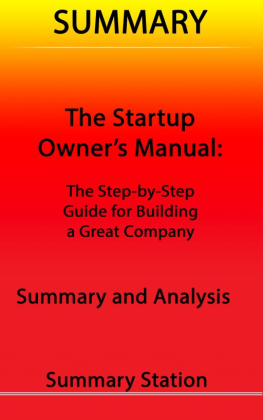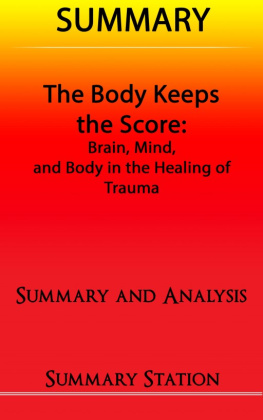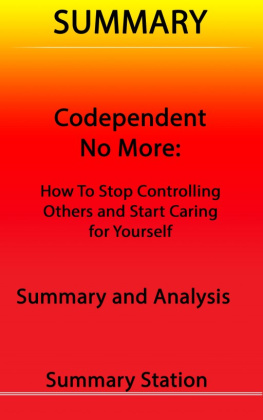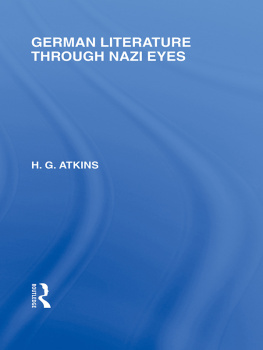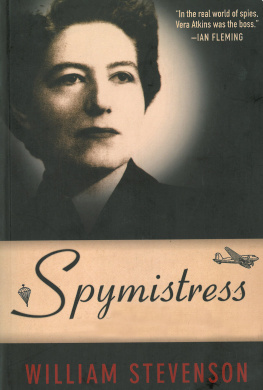Summary and Analysis of Spymistress:
The True Story of the Greatest Female Secret Agent of World WarII
Summary Station
Copyright 2014 by Summary Station
All rights reserved. This book or any portionthereof
may not be reproduced or used in any mannerwhatsoever
without the express written permission of thepublisher
except for the use of brief quotations in a bookreview.
Printed in the United States of America
First Printing, 2014
Smashwords Edition
Table ofContents
Summary of Spymistress
Chapter 1
Once through the Preface and Introductionsections of Spymistress, chapter one details some of the historyand beginnings which shaped the early life of Vera Atkins.Beginning with her birth in Romania and telling of her relationshipwith her father, Max Rosenberg. Rosenberg became somewhat of amystery to the young Atkins as he remained faithful to his Jewishname at a time when he might have been much safer claiming hislawful German status.
Due to Rosenberg's advice, There is safetyin conjecture, Atkins grew up learning to be a mass ofconflictions. This served her well in later life by helping toconfuse her enemies. Upon her relocation to Britain, Atkinsfollowed another piece of her father's advice when he advised hernot to sign any paperwork. She created her own identity and tookher maternal grandfather's surname which he had already changedfrom Etkins due to anti-Semitism in Russia.
Atkins along with her mother and two brotherswere estranged from Rosenberg during the First World War, living inGermany, trapped there by the outbreak of war. They sought refugewith Rosenberg's brother, a German soldier,
Once reunited, Rosenberg had the finesthorsemen and marksmen teach his daughter to ride and shoot, thebest dance teachers taught her to dance and she was sent tofinishing schools in France and Switzerland in the hope she wouldadopt the upper class sophistications which would enable her totravel through any borders. In her teens, Atkins assisted herfather in helping to get Zionists, disguised as peasants, pastborder guards. Over time, Atkins noticed that the guards caredlittle for the peasants as their attention focussed on the upperclass Rosenberg.
Atkins went on to meet a Canadian Businessmanand voluntary member of the Industrial Intelligence Centre, WilliamStephenson. Stephenson made an evaluation of Atkins, assessing herexperience in Germany to be an advantage to the British and lettingher know another war was inevitable. Stephenson also introducedAtkins to the German diplomat Count Friedrich Werner von derSchulenburg, who he saw as anti-Nazi. Schulenburg described AdolphHitler as a madman. Atkins and Schulenburg became friends andeventually he told her he was in love with her. Atkins kept up herend of the relationship and took many drives into the country,asking Schulenburg numerous questions regarding the Nazi's inGermany. Conversations she then related to Stephenson who gaveAtkins a secure London address she could write to and oneSchulenburg could write to when she went to work in Stephenson'sSt. James' office. However, as he was such an important source ofinformation, Stephenson advised Atkins to remain in close contactwith Schulenburg for the time being. After Schulenburg returnedfrom a visit to Berlin, he told Atkins how Stalin was makingweaponry for Germany, a blatant breach of the Treaty of Versailles,as a prelude to war. Schulenburg wanted Atkins to move to London ashe saw her as the single person he could fully trust on the Britishside of the growing Anglo-German gap.
In late 1933, Atkins moved to London at theadvice of Stephenson who saw massive war preparations takingplace.
Chapter 2
Rosenberg had given Atkins further advice bytelling her never to trust any form of secret service as most ofthem wrote lies to fit their versions of the truth and anyinformation fabricated against her name could be brought up yearslater. Rosenberg advised his daughter to pretend to be the mostEnglish, God fearing woman she could be; he had no trust forBritish intelligence officers in Whitehall.
William Stephenson helped fight an internaland unseen war against those he called Guilty Men, members of theBritish government who wanted to mollify Hitler and took Atkins ona walk around Whitehall showing her where they plotted. While theywalked, Stephenson told her how the King had allowed the Russiansto execute his cousin and how the Prince of Wales saw an armedGermany as a barrier to Stalin, both due to their fear of theRussian Bolsheviks.
Stephenson also introduced her to a group hecalled Our Mutual Friends. This group dedicated themselves torevealing information about the lack of British defences throughWinston Churchill, who was completely out of power and favour atthe time. Some of these Mutual Friends, who risked their lives toget this information out, had met Atkins before, in Bucharest.
English society remained largely ignorant ofHitler's vile atrocities, to Atkins' shock, with wild parties beingheld for the select while in Germany, massive book burnings tookplace for any books written by Jews or non-Nazis. During thisperiod, Atkins had the use of one of Stephenson's flats to whichshe received mail from her friend Schulenburg. He told her ofHitler's rise to power and about how many members of the seniorstaff were being seduced with money and power. When he waseventually sent to Russia, Schulenburg was ordered to tell Stalinthat Nazi propaganda speaking against communism was merely internalpoliticking.
Atkins met men of power who believed ifHitler ruled Europe, Britain could keep a hold on its Mid-East andAsian colonies. One notable example of this was Lord Londonderry,who also looked favourably upon Nazi leaders as they might provideprofitable commercial opportunities. The British press alsopropagated this mentality by ignoring their own foreign journalistsstationed in Germany who reported the legalised murdering of babieswho were considered to be imperfect, tests to identify pure Aryanstock, and the growth of concentration camps. Information washidden from the government by greedy newspaper owners who wantedseats in the House of Lords and did not want to jeopardise that byprinting words no one wanted to read. Stephenson made Atkins awareof an England which was scared to have another war but seemingly asscared to do anything to prevent one.
Atkins developed a respect for and friendshipwith London's East End working class who were not as blind as theirupper class West End neighbours to the threat of war. Interminglingwith continental immigrants meant they had the news first hand fromeyewitness accounts; the building of bombers in Russia for theGerman air force, for example.
Chapter 3
Atkins thought the assassination of AdolphHitler would be supported by the British because it would save manyof the more than half a million Jews he was persecuting, if nothingelse. Although her new friend, nicknamed Stringbag, told herBritish ruling classes could not care less about Jews and were moreimpressed by Germany's new found orderliness. They would beappalled to hear of any assassination attempt as it would throw thecontinent back into chaos. Hitler was welcomed by the Britishruling class, while at the same time; he was ordering thesystematic persecution of all Jews.
In 1935, Britain agreed terms with Hitlerallowing Germany to have a naval fleet equal to a significantpercentage of that owned by Britain. In a breach of The Treaty ofVersailles, Britain advertised to the world it was happy forGermany to be rearmed in order to oppose Stalinist Russia. AsChurchill stated, German treaty breaking has been condoned andeven extolled.
Atkins, Stringbag and Stephenson concludedassassinating Hitler would have to be left for now due to theunpredictable changes such assassinations brought; however, theyalso concluded there was now no political way to usurp hispower.


